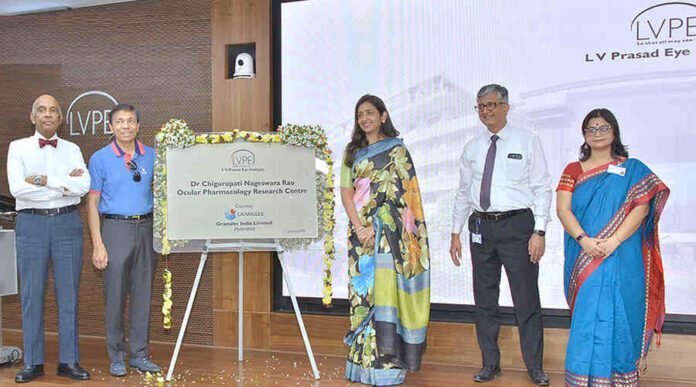- LVPEI, Hyderabad, inaugurated the ‘Dr Chigurupati Nageswara Rao Ocular Pharmacology Research Centre’, supported by Granules India Ltd, on 17th January 2024.
- This facility is set to revolutionize the landscape of ocular drug research in India by studying the intricacies of ocular diseases, understanding drug interactions with disease-causing microorganisms, and pioneering personalized eye care treatments.
Hyderabad, January 2024: The L V Prasad Eye Institute (LVPEI) created yet another milestone with the inauguration of the ‘Dr Chigurupati Nageswara Rao Ocular Pharmacology Research Centre‘ at its Kallam Anji Reddy Campus in Hyderabad, Telangana. This ground-breaking initiative, generously supported by Granules India Ltd, a leading Indian pharmaceutical manufacturing company based in Hyderabad, positions LVPEI as a trailblazer in advancing eye care treatments.
Named in honour of the late Dr Chigurupati Nageswara Rao, Former Chairman of Granules India Ltd. and a famous surgeon from Guntur, Andhra Pradesh, this state-of-the-art centre is set to revolutionize the landscape of ocular pharmacological research in India. This dedicated facility will delve into the intricacies of ocular diseases, understand drug interactions with pathogens (disease-causing microorganisms), and pioneer personalized eye care treatments.
Dr Sanhita Roy, the Head of Ocular Pharmacology Research at LVPEI, emphasized the centre’s ability to accelerate progress in Ocular Pharmacological Research. She highlighted the centre’s goals, which range from comprehending the therapeutic effects of medicines to refining drug dosages and creating new drugs for medical treatments.
Beyond research, the centre will also foster collaboration and contribute to educating and training the next generation of scientists and healthcare providers.
Ms Uma Devi Chigurupati, Executive Director of Granules India Ltd, present during the inauguration, congratulated LVPEI for its relentless work in eye care. She expressed her commitment to societal transformation: “By supporting LVPEI in establishing this pharmacological research centre, we are contributing to society’s transformation through its ground-breaking research in drug discovery.”
Dr Prashant Garg, the Executive Chair of LVPEI stated that “the ‘Dr Chigurupati Nageswara Rao Ocular Pharmacology Research Centre’ is strategically aligned with LVPEI’s goal of purposeful research. The research centre is uniquely positioned to lead the way in eye care drug delivery, from laboratory research to practical application in the community and at the bedside. This is a significant step toward a brighter future in ocular pharmacological research. The ground-breaking discoveries made at the centre will shape how we approach eye care.”
LVPEI, in collaboration with Granules India Ltd, is set to lead the charge in transforming the landscape of eye care treatments.
About LVPEI: Established in 1987, L V Prasad Eye Institute (LVPEI), a World Health Organization Collaborating Centre for Prevention of Blindness, is a comprehensive eye health facility. The Institute has ten functional arms to its areas of operations: Clinical Services, Education, Research, Vision Rehabilitation, Rural and Community Eye Health, Eye Banking, Advocacy and Policy Planning, Capacity Building, Innovation, and Product Development. The LVPEI Eye Care Network has 290 Centres spread across Telangana, Andhra Pradesh, Odisha, and Karnataka in India. The institute’s mission is to provide equitable and quality eye care to all sections of society. The LVPEI’s five-tier ‘Eye Health Pyramid’ model, covering all areas of the community right from the villages to the city, provides high quality and comprehensive – prevention, curative, and rehabilitation – eye care to all. It has served over 36.89 million (3 crores 68 lakh people), with more than 50% entirely free of cost, irrespective of the complexity of care needed.



